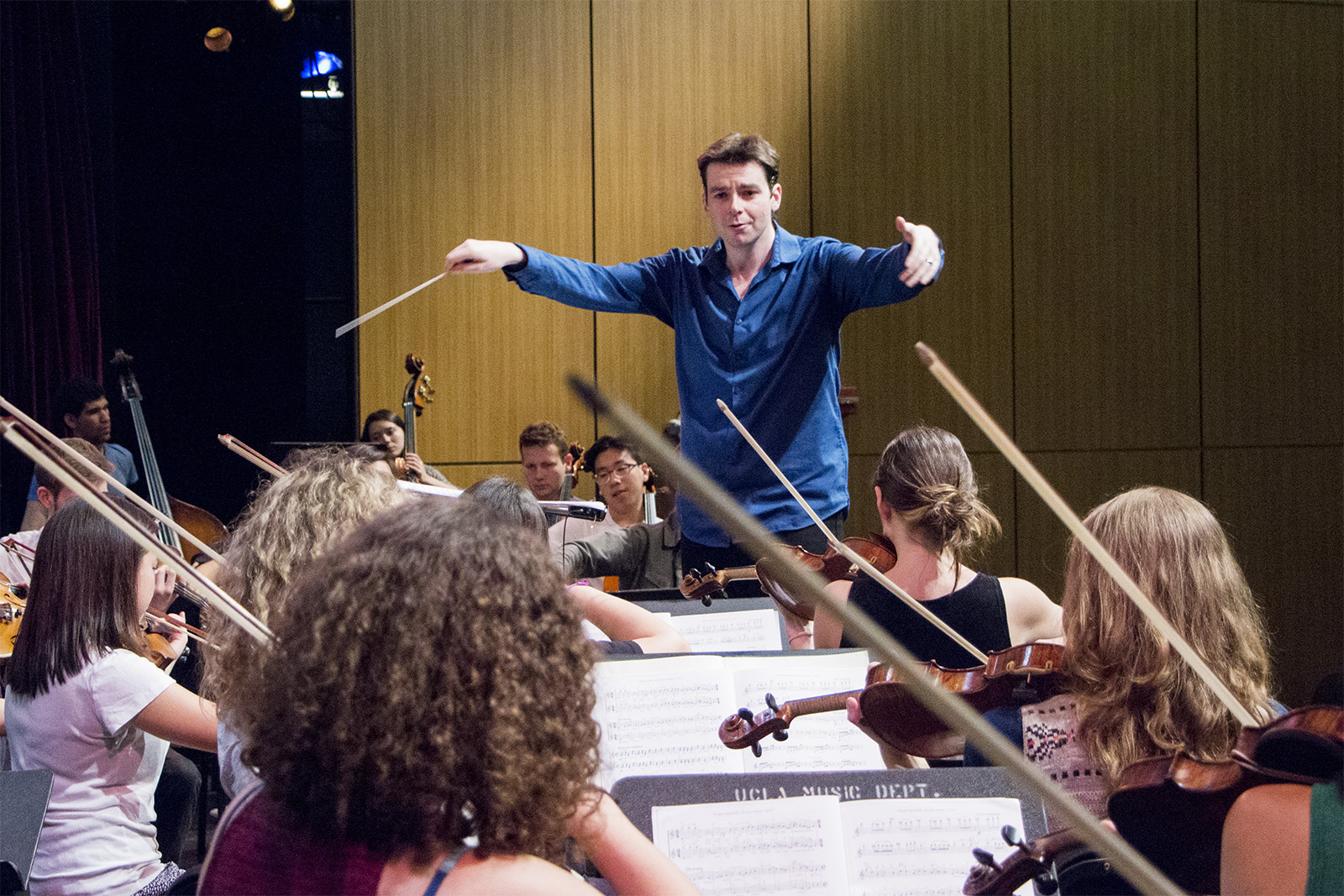Doctoral student makes compositional debut paying homage to film noir

Doctor of musical arts student Geoffrey Pope will lead the UCLA Philharmonia in performing his original composition “Overture Noir” in concert, along with the orchestral pieces “Suite” by Bernard Herrmann and “Liebestod” by Richard Wagner. (Erin Gong/Daily Bruin)
By Derrick Kemp
Nov. 9, 2016 6:58 p.m.
Geoffrey Pope hopes his latest composition will transport listeners into a classic Hollywood film scene full of femme fatales, smoky jazz clubs and fedoras.
Pope, a doctor of musical arts student, will debut his original composition “Overture Noir” at the UCLA Philharmonia’s Thursday concert in Schoenberg Hall. Pope will conduct the orchestra in playing his original piece, which will be performed in conjunction with standard orchestra repertoire including Bernard Herrmann’s “Suite” from the film “Vertigo” and “Liebestod” from Richard Wagner’s opera “Tristan und Isolde.”
Unlike the other two classical pieces of the concert, Pope’s original composition “Overture Noir” is an avant-garde homage to the film noir genre popularized by American cinema during the 1940s, he said.
[Related: UCLA Philharmonia honored professor William Klug with free concert]
Growing up, the burgeoning composer said his father instilled an appreciation for Old Hollywood film and noir novels, Pope said. Although music composition has been an avocation of Pope’s since he was 14 years old, Thursday’s performance of the piece marks Pope’s compositional debut at UCLA, since his formal training as a music student on campus has thus far focused on conducting, he said.
“The greatest possible experience for a composer is having their music played by an orchestra,” Pope said. “I feel honored by how seriously they’re taking the piece.”
Original compositions by students are not as commonly featured in Philharmonia’s series as other orchestral repertoire, making Pope’s show a rare experience for all involved, said Neal Stulberg, the department chair and co-director of orchestral studies.
“(Pope’s) piece was a discovery for our players, since they really didn’t know him as a composer,” Stulberg said. “It’s very attractive and witty, as well as being quite challenging.”
[Related: UCLA Philharmonia to play classical, contemporary music at UCLA, LACMA]
In his composition, Pope incorporated the technique of diegetics, or the difference in sounds between onstage and offstage performers, often used in the soundtracks of film noirs. In the opening sequence of a film noir, a saxophone and violin playing would represent non-diegetic sound, while the sounds of car horns and rain drops pattering against the pavement would be diegetic, or within the story.
Pope studied diegesis as part of his doctoral work at UCLA, and the technique plays a prominent role in “Overture Noir,” he said. At one point in the piece, a sensual jazz number played by saxophone, standing bass and drums emanates offstage, reminiscent of something a viewer would hear while watching the character Rick Blaine saunter through a jazz club in “Casablanca.” Onstage instruments are used to produce sounds similar to that of a record being played.
“The idea is that you create different sonic fields by placing instruments in different places,” Pope said. “We mix contemporary music … creating an almost three dimensional musical field, and it came out of these diegetic elements.”
Diegetics have been used in cinema for decades, such as in Alfred Hitchcock’s famous shower scene in “Psycho.” The diegetic, in-world sounds of Janet Leigh’s screams while she is brutally stabbed are juxtaposed against the instrumental screeching, heard by the audience but not the character. Hitchcock film scores were among Pope’s inspirations for “Overture Noir,” he said.
Stephanie Spencer, a fourth-year music student and the concertmaster for the show, said she was skeptical about the piece after the first read-through rehearsal, because the concept behind Pope’s music was so abstract and modern compared to the more classical pieces “Suite” and “Liebestod.”
“It was questionable the first time we read through it,” Spencer said. “It touches on a lot of dissonance and it’s slightly atonal.”
However, after a week of rehearsing the piece, Spencer decided it was the very dissonant nature of Pope’s piece that made the music stand out from the other compositions in the concert, she said.
“Overture Noir” deviates from other music of 1940’s cinema by incorporating surprising discordant sounds, rather than relying on more mellifluous melodies and tonal harmonies that create a more polished sound, Spencer said.
Throughout the piece, Pope also incorporates non-musical sound devices, such as cello and wind players hissing to give the impression of phonographic records being played within an old film or popping balloons to simulate possible gunshots.
“It’s sort of a film noir trope to have these resounding exclamations,” Pope said.
From the concert, Pope wants audience members to hear the musical and cinematic lineage that inspired his piece, and hopes he has succeeded in bringing the past to life through the music, he said.
“If you add all the years each person in the orchestra has been practicing, it’s somewhere between one or two millennia,” Pope said. “I treat the orchestra as if it is a multi-faceted instrument.”


